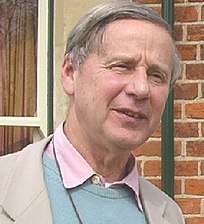William Quantrill (diplomat)
William Ernest Quantrill (born 4 May 1939) is a former British diplomat who served as Ambassador to Cameroon from 1991 to 1995.[1]

Early life
Quantrill was schooled at Colston's in Bristol and then went on to Durham for his university studies, graduating with a first-class BA in French.[1] He was a member of Hatfield College and was Secretary of the Junior Common Room in 1959.[2] He also represented his college at rugby.[3] Furthermore, he served as Editor of Palatinate in 1960.[4] After university, Quantrill began working for the Foreign and Commonwealth Office in 1962.[1] He was appointed to HM Diplomatic Service in December 1965.[5]
Career
From 1964 to 1980 he served in several overseas posts in Belgium, Cuba, The Philippines, and Nigeria.[6] From 1980-1981 he was Head of Training Department and from 1984 to 1988 was Counsellor and Head of Chancery at the British Embassy in Venezuela.[6] He subsequently served as Deputy Governor of Gibraltar until 1990.[7] Quantrill's tenure in Gibraltar, which also included a time as Acting Governor in 1989, coincided with a breakdown in relations between the Gibraltar and Spanish governments after a Gibraltarian court had ordered the apprehension of four Spanish customs officials accused of illegal entry and illegal possession of arms.[8] Consequently, Quantrill was forced to hold a crisis meeting in London with Nicholas Gordon-Lennox, the British Ambassador to Spain, on 29 July 1989.[8]
Cameroon
Quantrill became Ambassador to Cameroon in 1991, also serving as non-resident representative to the Central African Republic, Equatorial Guinea, and Chad. In a 2005 interview Quantrill argued that the reluctance of Paul Biya to delegate responsibility hampered the quality of governance, with trivial decisions often delayed until he got round to delivering them, and that there was too much government interference in the economy in general.[9]
In retirement, Quantrill was one of 52 former British diplomats to sign a letter in 2004 criticizing then British and American policy towards Iraq.[10]
| Diplomatic posts | ||
|---|---|---|
| Preceded by Martin Reith |
British Ambassador to Cameroon 1991–1995 |
Succeeded by Nicholas McCarthy |
References
- "Quantrill, William Ernest". Who's Who (UK). Retrieved 15 April 2019.
- Moyes, Arthur (1996). Hatfield 1846-1996. p. 287.
- Moyes, Arthur (2007). Be The Best You Can Be: A History of Sport at Hatfield College, Durham University. Hatfield Trust. p. 120.
- "Editorial". Palatinate (136): 2. 17 June 1960. Retrieved 10 September 2018.
- "The London Gazette, 11th January 1966". The London Gazette. p. 330. Retrieved 25 June 2019.
- "British Diplomats Directory: Part 2 of 4". Issuu.
- "Letter: Towards a deal on Gibraltar". The Independent. 9 July 1997. Retrieved 28 May 2018.
- Gold, Peter (2005). "A European Hong Kong?". Gibraltar: British or Spanish?. Psychology Press. p. 120.
- Kometa, Georgiana Magho. "There Was Disparity Between Biya's Professed Policies And Reality -Former British Ambassador". Up Station Mountain Club. Retrieved 25 June 2019.
- MacAskill, Ewen; White, Michael (28 April 2004). "How email became a diplomatic incident". the Guardian. Retrieved 29 May 2018.